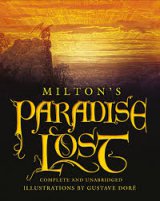Paradise Lost Page #8
Paradise Lost is an epic poem in blank verse by the 17th-century English poet John Milton. The first version, published in 1667, consisted of ten books with over ten thousand lines of verse. A second edition followed in 1674, arranged into twelve books with minor revisions throughout and a note on the versification.
Well have ye judg’d, well ended long debate, Synod of Gods, and like to what ye are, Great things resolv’d; which from the lowest deep Will once more lift us up, in spight of Fate, Neerer our ancient Seat; perhaps in view Of those bright confines, whence with neighbouring Arms And opportune excursion we may chance Re-enter Heav’n; or else in some milde Zone Dwell not unvisited of Heav’ns fair Light Secure, and at the brightning Orient beam Purge off this gloom; the soft delicious Air, To heal the scarr of these corrosive Fires Shall breath her balme. But first whom shall we send In search of this new world, whom shall we find Sufficient? who shall tempt with wandring feet The dark unbottom’d infinite Abyss And through the palpable obscure find out His uncouth way, or spread his aerie flight Upborn with indefatigable wings Over the vast abrupt, ere he arrive The happy Ile; what strength, what art can then Suffice, or what evasion bear him safe Through the strict Senteries and Stations thick Of Angels watching round? Here he had need All circumspection, and we now no less Choice in our suffrage; for on whom we send, The weight of all and our last hope relies. This said, he sat; and expectation held His look suspence, awaiting who appeer’d To second, or oppose, or undertake The perilous attempt: but all sat mute, Pondering the danger with deep thoughts; & each In others count’nance red his own dismay Astonisht: none among the choice and prime Of those Heav’n-warring Champions could be found So hardie as to proffer or accept Alone the dreadful voyage; till at last Satan, whom now transcendent glory rais’d Above his fellows, with Monarchal pride Conscious of highest worth, unmov’d thus spake. O Progeny of Heav’n, Empyreal Thrones, With reason hath deep silence and demurr Seis’d us, though undismaid: long is the way And hard, that out of Hell leads up to Light; Our prison strong, this huge convex of Fire, Outrageous to devour, immures us round Ninefold, and gates of burning Adamant Barr’d over us prohibit all egress. These past, if any pass, the void profound Of unessential Night receives him next Wide gaping, and with utter loss of being Threatens him, plung’d in that abortive gulf. If thence he scape into what ever world, Or unknown Region, what remains him less Then unknown dangers and as hard escape. But I should ill become this Throne, O Peers, And this Imperial Sov’ranty, adorn’d With splendor, arm’d with power, if aught propos’d And judg’d of public moment, in the shape Of difficulty or danger could deterre Me from attempting. Wherefore do I assume These Royalties, and not refuse to Reign, Refusing to accept as great a share Of hazard as of honour, due alike To him who Reigns, and so much to him due Of hazard more, as he above the rest High honourd sits? Go therfore mighty powers, Terror of Heav’n, though fall’n; intend at home, While here shall be our home, what best may ease The present misery, and render Hell More tollerable; if there be cure or charm To respite or deceive, or slack the pain Of this ill Mansion: intermit no watch Against a wakeful Foe, while I abroad Through all the coasts of dark destruction seek Deliverance for us all: this enterprize None shall partake with me. Thus saying rose The Monarch, and prevented all reply, Prudent, least from his resolution rais’d Others among the chief might offer now (Certain to be refus’d) what erst they feard; And so refus’d might in opinion stand His rivals, winning cheap the high repute Which he through hazard huge must earn. But they Dreaded not more th’ adventure then his voice Forbidding; and at once with him they rose; Thir rising all at once was as the sound Of Thunder heard remote. Towards him they bend With awful reverence prone; and as a God Extoll him equal to the highest in Heav’n: Nor fail’d they to express how much they prais’d, That for the general safety he despis’d His own: for neither do the Spirits damn’d Loose all thir vertue; least bad men should boast Thir specious deeds on earth, which glory excites, Or close ambition varnisht o’re with zeal. Thus they thir doubtful consultations dark Ended rejoycing in thir matchless Chief: As when from mountain tops the dusky clouds Ascending, while the North wind sleeps, o’respread Heav’ns chearful face, the lowring Element Scowls ore the dark’nd lantskip Snow, or showre; If chance the radiant Sun with farewell sweet Extend his ev’ning beam, the fields revive, The birds thir notes renew, and bleating herds Attest thir joy, that hill and valley rings. O shame to men! Devil with Devil damn’d Firm concord holds, men onely disagree Of Creatures rational, though under hope Of heavenly Grace: and God proclaiming peace, Yet live in hatred, enmitie, and strife Among themselves, and levie cruel warres, Wasting the Earth, each other to destroy: As if (which might induce us to accord) Man had not hellish foes anow besides, That day and night for his destruction waite.
Translation
Translate and read this book in other languages:
Select another language:
- - Select -
- 简体中文 (Chinese - Simplified)
- 繁體中文 (Chinese - Traditional)
- Español (Spanish)
- Esperanto (Esperanto)
- 日本語 (Japanese)
- Português (Portuguese)
- Deutsch (German)
- العربية (Arabic)
- Français (French)
- Русский (Russian)
- ಕನ್ನಡ (Kannada)
- 한국어 (Korean)
- עברית (Hebrew)
- Gaeilge (Irish)
- Українська (Ukrainian)
- اردو (Urdu)
- Magyar (Hungarian)
- मानक हिन्दी (Hindi)
- Indonesia (Indonesian)
- Italiano (Italian)
- தமிழ் (Tamil)
- Türkçe (Turkish)
- తెలుగు (Telugu)
- ภาษาไทย (Thai)
- Tiếng Việt (Vietnamese)
- Čeština (Czech)
- Polski (Polish)
- Bahasa Indonesia (Indonesian)
- Românește (Romanian)
- Nederlands (Dutch)
- Ελληνικά (Greek)
- Latinum (Latin)
- Svenska (Swedish)
- Dansk (Danish)
- Suomi (Finnish)
- فارسی (Persian)
- ייִדיש (Yiddish)
- հայերեն (Armenian)
- Norsk (Norwegian)
- English (English)
Citation
Use the citation below to add this book to your bibliography:
Style:MLAChicagoAPA
"Paradise Lost Books." Literature.com. STANDS4 LLC, 2024. Web. 22 Nov. 2024. <https://www.literature.com/book/paradise_lost_101>.




Discuss this Paradise Lost book with the community:
Report Comment
We're doing our best to make sure our content is useful, accurate and safe.
If by any chance you spot an inappropriate comment while navigating through our website please use this form to let us know, and we'll take care of it shortly.
Attachment
You need to be logged in to favorite.
Log In